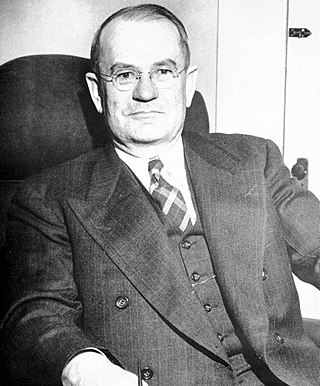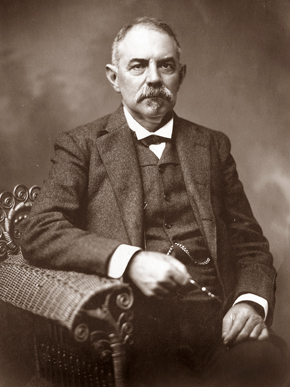| |||||||||||||||||
| |||||||||||||||||
 County results O'Neal: >90% No Data | |||||||||||||||||
| |||||||||||||||||
The 1884 Alabama gubernatorial election took place on August 4, 1884, in order to elect the governor of Alabama. Incumbent Democrat Edward A. O'Neal ran unopposed.
| |||||||||||||||||
| |||||||||||||||||
 County results O'Neal: >90% No Data | |||||||||||||||||
| |||||||||||||||||
| Elections in Alabama |
|---|
 |
The 1884 Alabama gubernatorial election took place on August 4, 1884, in order to elect the governor of Alabama. Incumbent Democrat Edward A. O'Neal ran unopposed.
| Party | Candidate | Votes | % | |
|---|---|---|---|---|
| Democratic | Edward A. O'Neal (incumbent) | 143,229 | 99.71 | |
| Other | Write-ins | 415 | 0.29 | |
| Total votes | 143,644 | 100.00 | ||
| Democratic hold | ||||

George Corley Wallace Jr. was the 45th governor of Alabama, serving from 1963 to 1967, again from 1971 to 1979, and finally from 1983 to 1987. He is remembered for his staunch segregationist and populist views; however, in the late 1970s, Wallace moderated his views on race, renouncing his support for segregation. During Wallace's tenure as governor of Alabama, he promoted "industrial development, low taxes, and trade schools." Wallace unsuccessfully sought the United States presidency as a Democratic Party candidate three times, and once as an American Independent Party candidate, carrying five states in the 1968 election. Wallace opposed desegregation and supported the policies of "Jim Crow" during the Civil Rights Movement, declaring in his infamous 1963 inaugural address that he stood for "segregation now, segregation tomorrow, segregation forever".

Oscar Wilder Underwood was an American lawyer and politician from Alabama, and also a candidate for President of the United States in 1912 and 1924. He was the first formally designated floor leader in the United States Senate, and the only individual to serve as the Democratic leader in both the Senate and the United States House of Representatives.

George Chauncey Sparks, known as Chauncey Sparks, was an attorney and Democratic American politician who served as the 41st Governor of Alabama from 1943 to 1947. He improved the state education of whites and expanded the state schools and centers for agriculture. He campaigned for passage of the Boswell Amendment to the state constitution, which was designed to keep blacks disfranchised following the US Supreme Court ruling Smith v. Allwright (1944) against the use of white primaries by the Democratic Party in the states.

Benjamin Meek Miller was an American Democratic politician who served as the 39th Governor of Alabama from 1931 to 1935.

Thomas Goode Jones was an Alabama lawyer, politician, and military officer. He served in the Alabama legislature and as Governor of Alabama. He later became United States district judge of the United States District Court for the Middle District of Alabama and the United States District Court for the Northern District of Alabama.

David P. Lewis was a lawyer and politician who served as the 23rd governor of Alabama from 1872 to 1874 during the Reconstruction era. He was also a Deputy from Alabama to the Provisional Congress of the Confederate States, serving from February until April 1861, when he resigned from office. He was a Unionist. He was the last Republican to serve as Governor of Alabama until H. Guy Hunt was elected in 1986.

Edward Aylesworth Perry was a general under Robert E. Lee during the American Civil War and the 14th Governor of Florida.
Thomas J. Seay was an American Democratic politician who was the 27th Governor of Alabama from 1886 to 1890.

Events from the year 1831 in the United States.

Bourbon Democrat was a term used in the United States in the later 19th century and early 20th century (1872–1904) to refer to members of the Democratic Party who were ideologically aligned with fiscal conservatism or classical liberalism, especially those who supported presidential candidates Charles O'Conor in 1872, Samuel J. Tilden in 1876, President Grover Cleveland in 1884, 1888, and 1892 and Alton B. Parker in 1904.

The lieutenant governor of Alabama is the president of the Alabama Senate, elected to serve a four-year term. The office was created in 1868, abolished in 1875, and recreated in 1901. According to the current constitution, should the governor be out of the state for more than 20 days, the lieutenant governor becomes acting governor, and if the governor dies, resigns or is removed from office, the lieutenant governor ascends to the governorship. Earlier constitutions said the powers of the governor devolved upon the successor, rather than them necessarily becoming governor, but the official listing includes these as full governors. The governor and lieutenant governor are not elected on the same ticket.
The Most Worshipful Grand Lodge of Free and Accepted Masons of the State of Alabama, commonly called the Grand Lodge of Alabama, is one of two Masonic grand lodges in the state of Alabama, the other being the predominantly African American Prince Hall Grand Lodge of Alabama.

Kay Ellen Ivey is an American politician who is the 54th governor of Alabama, serving since 2017. Originally a conservative Southern Democrat, Ivey became a member of the Republican Party in 2002. She was the 38th Alabama state treasurer from 2003 to 2011 and the 30th lieutenant governor of Alabama from 2011 to 2017.

The 2010 Alabama gubernatorial election took place on November 2, 2010. Incumbent Governor Bob Riley was term-limited and unable to seek re-election. The party primaries were held on June 1, 2010, with a Republican runoff on July 13. In the general election, Robert J. Bentley defeated Democrat Ron Sparks. This was the first election in which Republicans won three consecutive gubernatorial elections in the state. This was also the first time since Reconstruction that a Republican carried Colbert County, Franklin County, and Lawrence County in a gubernatorial race.

The 2018 Alabama gubernatorial election took place on November 6, 2018, to elect the governor of Alabama. Incumbent Governor Kay Ivey (R), who took office on April 10, 2017 upon the resignation of Robert Bentley (R), ran for election to a full term and won over Tuscaloosa mayor Walt Maddox. Ivey was sworn in for her first full term on January 14, 2019. This was the first time since 1966 that a woman was elected governor of Alabama.

The 1888 United States presidential election in Alabama was held on November 6, 1888, as part of the concurrent Presidential election in which all thirty-eight contemporary states participated. Alabama voters chose ten electors, or representatives to the Electoral College, who voted for President and Vice-President.

The 1884 United States presidential election in Alabama took place on November 4, 1884, as part of the nationwide presidential election. Alabama voters chose ten representatives, or electors, to the Electoral College, who voted for president and vice president.

The 2022 Alabama gubernatorial election took place on November 8, 2022, to elect the governor of Alabama. Incumbent Governor Kay Ivey took office on April 10, 2017, upon the resignation of Robert J. Bentley (R) and won a full term in 2018. In 2022, she won her bid for a second full term in a landslide.

The 2022 Alabama lieutenant gubernatorial election was held on November 8, 2022, to elect the lieutenant governor of the state of Alabama. The election coincided with various other federal and state elections, including for Governor of Alabama. Primary elections were held on May 24, with runoffs scheduled for June 21 if a candidate failed to receive a majority of the vote.